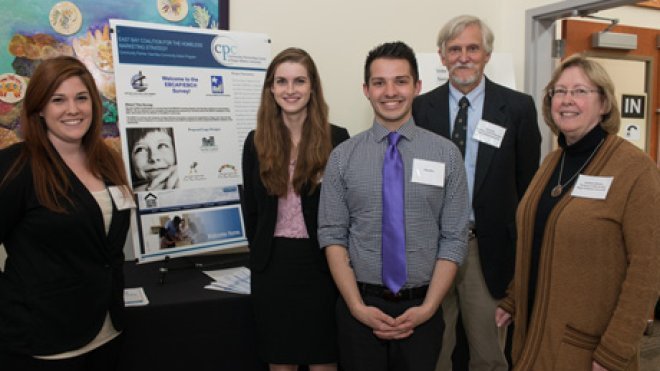Two Years, 50 Projects and an Immense Impact: Celebrating the CPC at RWU
Community partners and elected officials join RWU students, faculty and staff to commemorate those involved in CPC projects across the region

PROVIDENCE, R.I. – Fifty projects, 35 partner organizations, 39 faculty members, 529 students and some 23,000 hours of student and faculty work – those numbers offer a glimpse at the total impact that the Community Partnerships Center at Roger Williams University has made across the region since its launch just two years ago.
Last night, nearly 200 people – from community partners, to elected officials including Rhode Island Governor Lincoln D. Chafee and Providence Mayor Angel Taveras, to students, faculty and staff from Roger Williams – joined to celebrate the CPC at an event hosted by Meeting Street and sponsored by the Rhode Island Economic Development Corporation.
Chafee noted that the 22 projects highlighted at the celebration illustrate how each CPC undertaking benefits both local communities and the students engaged in offering their expertise.
“There is a youthful energy that’s just pulsating out of this great university into these old historic structures,” Chafee said. “From Adams Library, to the Bristol Armory to right here at Meeting Street school… Students are getting out into our communities, building skills and learning how to collaborate. And also, they are making the contacts that will keep them here in Rhode Island.”
A key component of the University’s Affordable Excellence initiative, the CPC pairs students and faculty with local nonprofits, municipalities and other organizations to tackle community projects that often require specialized expertise or additional resources. Students apply classroom learning and gain real-world experience by engaging in community projects such as economic development research and planning, public policy formulation, architectural design and urban planning.
Pointing to the CPC’s efforts to reimagine the Broad Street corridor in Providence through a partnership with RIEDC and SWAP, Inc. (Stop Wasting Abandoned Property), Taveras expressed his appreciation for the university’s widespread engagement in Providence and across Rhode Island.
“The key to moving our city and our state forward is collaboration and working together,” Taveras said. “CPC is doing exactly that – bringing great talent together, solving problems, preparing the next generation of leaders and never forgetting how important community is.”
Meeting Street President and CEO John Kelly, who worked with students and faculty from the education and architecture programs at RWU on a plan to adapt a building the school acquired near its South Providence campus, described engaging with the CPC as an intellectual development exercise.
“The ideas that students come up with… You think you know exactly how to do something, but they present you with four or five or 10 different things you’ve never even considered, and that’s absolutely incredible,” Kelly said. “It has changed our thinking.”
That’s exactly the kind of community impact that RWU President Donald J. Farish envisioned when the CPC launched university-wide not long after his 2011 arrival. And just as importantly, the Roger Williams students involved in each project emerge with a set of skills that can set them apart from their peers after graduation.
“These CPC projects are a wonderful illustration of how public-private partnerships can come together for the benefit of all concerned,” Farish said. “Civic engagement is one of our core values, and we know that the students taking on these projects will continue to be involved in making their communities a better place. There is simply no downside.”
After remarks from Bristol Town Administrator Antonio Teixeira, Central Falls Mayor James Diossa and Woonsocket Economic Development Director Matt Wojcik, CPC Director Arnold Robinson wrapped up the event by thanking everyone involved in turning each project into reality.
“There’s an old phrase that says you really can’t row a boat – the most you can do is kayak on the energies that exist,” Robinson said. “We are incredibly fortunate to have faculty, to have project partners from the organizations we work with, to have students and staff at the university whose energies we simply direct. We simply match them up, and they make these magical things happen with our projects."